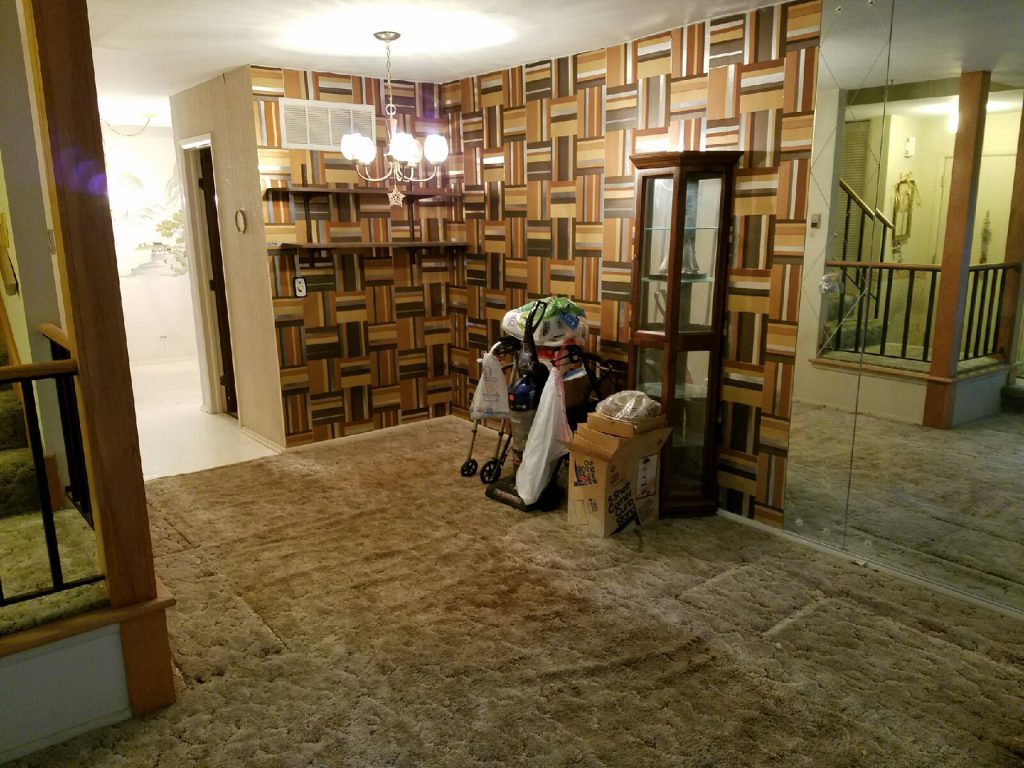
My brother asks the question, and it’s a tough one with no good answer. So I shrug, head upstairs, and he follows.
Vince and I have come to clean house, literally. Our parents—both closing in on ninety-one—sit in a nursing home about five miles north of us, their money evaporating by the minute. We need to sell the house, but to do that, we need to empty it, and to do that, we have to sift through forty-two years of accumulation.
I’ve seen my dad take out the trash before—it was one of his nightly rituals—but it’s hard to believe that they ever threw anything away. Stuff abounds, most with little or no value. In their dressers, clothes that haven’t been worn in years; in the den closet, a tower of empty J.C. Penney and Montgomery Ward boxes; in the basement, jars of ossified glue and paint.
In my dad’s desk I find a yellowed newspaper article from the 1980s about how to fix a leaky faucet. In his dresser, I find packing lists he made for trips we took to New York in the 1970s. And in his closet, I find his old drafting kit and homework from the 1940s, when he had planned to become an engineer but couldn’t get past calculus. Everything in that box has been sitting together for so long that they’re practically fused, and as I excavate plastic triangles and blue-backed diagrams, they disintegrate in my hands and spill onto the bedspread and floor in such small pieces that I have to vacuum.
My mom’s share of the inventory is marked by her favorite invention, Scotch Tape. I find little strips of it everywhere, still holding together pieces of their disappearing world—on the broken neck of a tiny ceramic guitar, a souvenir from Nashville; on the nameplate of my bronzed baby shoe; and on the back of the elaborate photo collages that I watched her put together when I was a kid and am now dismantling as an adult. I work carefully to untangle the spiderweb of tape, trying not to tear the delicate photos, some of which are even older than my parents.
We move to their bedroom, where I find something at the bottom of my dad’s nightstand. Books. The Encyclopedia of Sexual Knowledge, Everything You Always Wanted to Know about Sex (But Were Afraid to Ask), The Sensuous Man, The Sensuous Woman, Fear of Flying. Our parents were good Catholics and eager to start a family, so they were disappointed that kids didn’t come quickly or bountifully. Vince was born twelve years after they were married, and I was born six years after that. Tracing with my thumb the cracks in The Sensuous Man’s binding, I imagine the two of them reading to get a handle on some mysteries that weren’t exactly talked about in the open. Turning to books in this way is something I have done all my life, and even though I have no memories of them reading books—newspapers, letters, magazines, yes, but never books—I wonder now if this tendency came from them.
“You ready to make a trash run?” Vince asks.
We walk boxes and bags outside until we’ve filled almost four cavernous dumpsters and are exhausted. We’re sure we’ve dealt with everything we can handle, but we make one last check.
In the basement, tucked in the back of a cabinet, we find a heavy box filled with every card my parents have ever received. Vince and I look at each other. We know that we can’t just toss the box; too many times we’ve come across something of value—an old picture or letter—nearly drowned in a sea of trash. So we haul it up to the kitchen table and go through the Christmas cards, the get well cards, the birthday cards.
Ten minutes in, I glance at Vince, note the speedy rhythm with which he opens and discards each envelope, and immediately know that he’s doing the same thing I’m doing—looking for cash.
We’re about halfway through when he says, “Oh my God.” In one hand is a long rectangular card with the words CONGRATULATIONS ON YOUR BUNDLE OF JOY and in the other hand is a two-dollar bill. I stare in silence for what seems like a minute.
“You got a buck?” he finally asks.
As the older—and therefore more responsible—son who stuck close to home, Vince has borne the brunt of parental care duties, losing sleep when our dad still drove as his eyesight deteriorated, ferrying them to and from doctor appointments when my dad finally lost his license, enduring a nonstop onslaught of errands and meetings involving banks, health professionals, and realtors—all while trying to maintain his dental practice and worry about his own kids. In a few hours I’ll be on a plane back to California, leaving him to tie up the rest of the substantial loose ends, which will include meeting the men from 1-800-GOT-JUNK and bearing lone witness as they carry away the last of the things that filled our early lives, the last of our inheritance.
“Keep it,” I tell him.
If you haven’t seen Proximity‘s latest issue, themed INHERITANCE, begin with Shasta Grant’s Letter from the Editor and work your way through a complex collection of true stories.
 Rocco Versaci is an English professor at Palomar College in San Diego, where he teaches composition, creative writing, and literature (including comics). His latest book, That Hidden Road: A Memoir, is now available from Apprentice House. Visit him at www.roccoversaci.com.
Rocco Versaci is an English professor at Palomar College in San Diego, where he teaches composition, creative writing, and literature (including comics). His latest book, That Hidden Road: A Memoir, is now available from Apprentice House. Visit him at www.roccoversaci.com.
Rocco, I have tears in my eyes as I finished reading this beautifully written piece. In the past 2 1/2 years my mother mother has transitioned from living at home with a companion, to independent living, then assisted living, and now “sheltered care.” My seven siblings and I have been slowly chipping away at clearing her home and preparing to put it on the market. You captured the essence so well of the bittersweet process involved…and the little treasures you find sifting through insurmountable boxes of parental memories. I look forward to sharing this with my siblings.